Zainab was only 11 years old when she became the fourth wife of a 42-year-old cobbler in her community. She is from Marki, a village in Northern Nigeria where girls are married off at the age of 12 to preserve their purity. Her parents did not consider educating a girl child a worthy venture. Therefore, she was never sent to school. Her father said girls didn’t need to go to school because they wouldn’t use the knowledge. So, growing up, while her brothers went to school, being the only girl in her family, she hawked goods and waited for marriage.
Zainab had always dreamt of becoming a nurse. However, due to her parents’ stance on education, she could not discuss this desire with anyone. Instead, she was compelled to marry the cobbler her parents chose because they believed he would make a good husband. Unfortunately, that was not the case and for four years, Zainab endured rape and torture from her husband. Each time she complained to her mother, she would be told, ‘’Any woman who disobeys her husband will end up in hellfire’’.
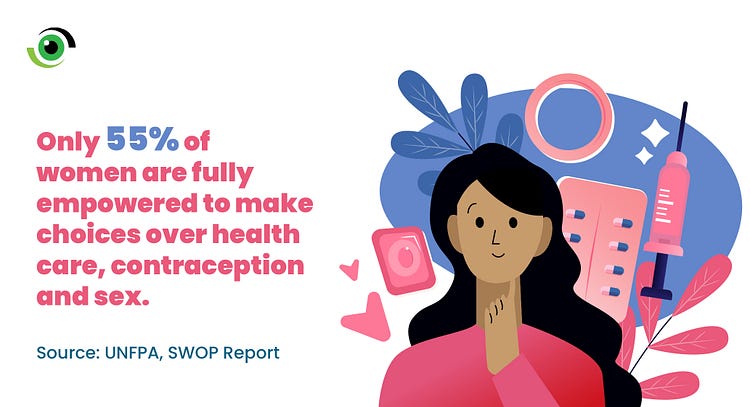
The trauma she suffered affected her mental health and Zainab soon became listless and withdrawn, doing only what was required of her. Fortunately, her story did not end badly. After having a baby, she fled her husband’s house and moved in with her aunt in a new city and started schooling. She is now a pharmacist and a baker, running her own business.
Zainab’s experience is not an isolated one. There are many examples of young women and girls all over Nigeria who have been deprived of the right to their bodies, social amenities and life, as well as access to education and healthcare, solely because of their gender. The case of the Becheve girls, in Obanliku, Cross River State, who were sold into marriage in exchange for goats, food items, and in settlement of their parents’ debt, is another sad example.
Bodily Autonomy
Lack of bodily autonomy is one of the many factors that contribute to gender inequality. Bodily autonomy means the power and agency women and girls have, to make choices over their bodies without violence or coercion. This includes when, whether or with whom to have sex or to become pregnant. It also means the freedom to access healthcare. The absence of this agency forces women to relinquish control over sexual and reproductive choices which often leads to disempowerment and diminished control in other areas of life.
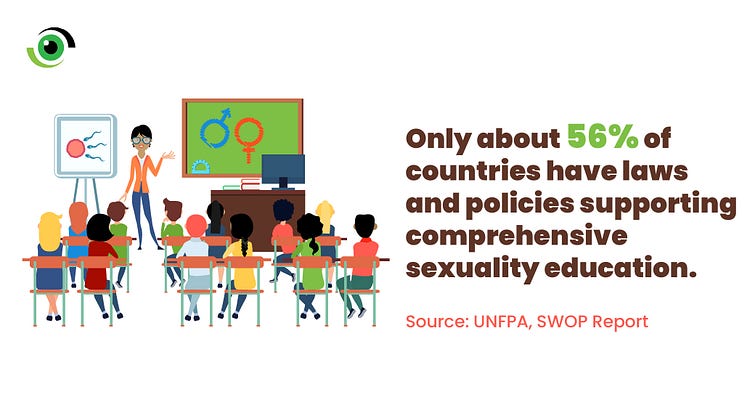
The State of the World Population (SWOP) Report, an annual publication of the UN Population Fund (UNFPA) highlights emerging issues in Sexual and Reproductive Health and Rights (SRHR). The theme for the 2021 report which was launched in April is “My Body is My Own: Claiming the Right to Autonomy and Self-Determination’’. The report showed that nearly half the women from 57 developing countries do not have the right to decide what happens to their bodies. That is, only 55% of women and girls can make their own decisions in all 3 dimensions of bodily autonomy — accessing health care, use of contraception and sex.
When women have autonomy over their bodies, they have the power to make choices without people deciding for them and without fear of violence. However, when the right to make informed decisions about their lives has been denied, either by violence, norms, practices or laws, it results in negative consequences which can be compounded by poverty. This affects their opportunities to access education and equitable healthcare, attain financial independence and develop personal ambitions, interests, and talents.
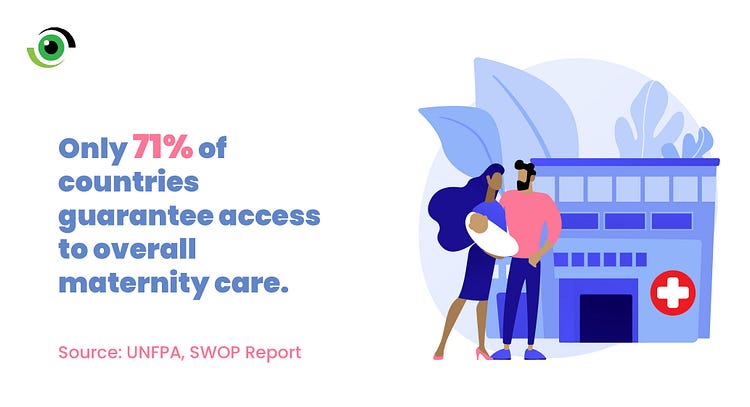
How can bodily autonomy be realised?
Many people do not realise that bodily autonomy is a right everyone deserves. Understanding it gives people the ability to stand up for their rights in society. To improve the lives of women and girls in Nigeria and globally, we must ensure they have full autonomy over their bodies. The UNFPA bodily SWOP report highlighted the following as ways to increase awareness about bodily autonomy:
First, women with more education are more likely to make their own decisions about contraception and healthcare, and to be able to say no to sex. Comprehensive sexuality education — meaning age-appropriate, accurate information about one’s reproductive health and rights — is also crucial. It helps prevent unintended pregnancy and sexually transmitted infections, and equips individuals to advocate for themselves.
Second, health providers have a critical role to play in upholding and affirming the bodily autonomy of those seeking information and care. Health workers must inform patients of their rights. They must get informed consent from patients before any bodily examination. Medical guidelines, trainings on legal requirements, and specific gender-sensitivity trainings can help healthcare providers actively support the bodily autonomy of patients.
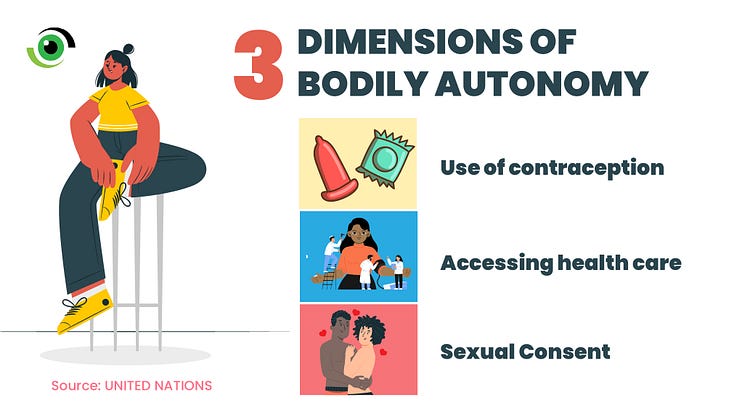
Third, social norms must also become more gender equitable. Improving women’s opportunities for livelihoods and leadership roles in their community and beyond can increase their power to make decisions within households and about their bodies.
Lastly, laws can have a significant impact on women’s rights, gender equality, and sexual and reproductive health. They must be aligned with globally agreed human rights principles and commitments and reviewed for gender responsiveness. The judiciary and police must also be aware of these laws and principles.
Gender inequality is perhaps the most widespread hindrance to bodily autonomy and achieving bodily autonomy depends on achieving gender equality. Sustainable Development Goal 5 aims to achieve gender equality and empower all women and girls thus, ensuring that women and men enjoy the same opportunities, rights and obligations in all spheres of life. Only when women have control over their bodies can they benefit from rights and opportunities in all other areas of their lives, whether that means going to school, caring for their family, starting a business, or leading a country.


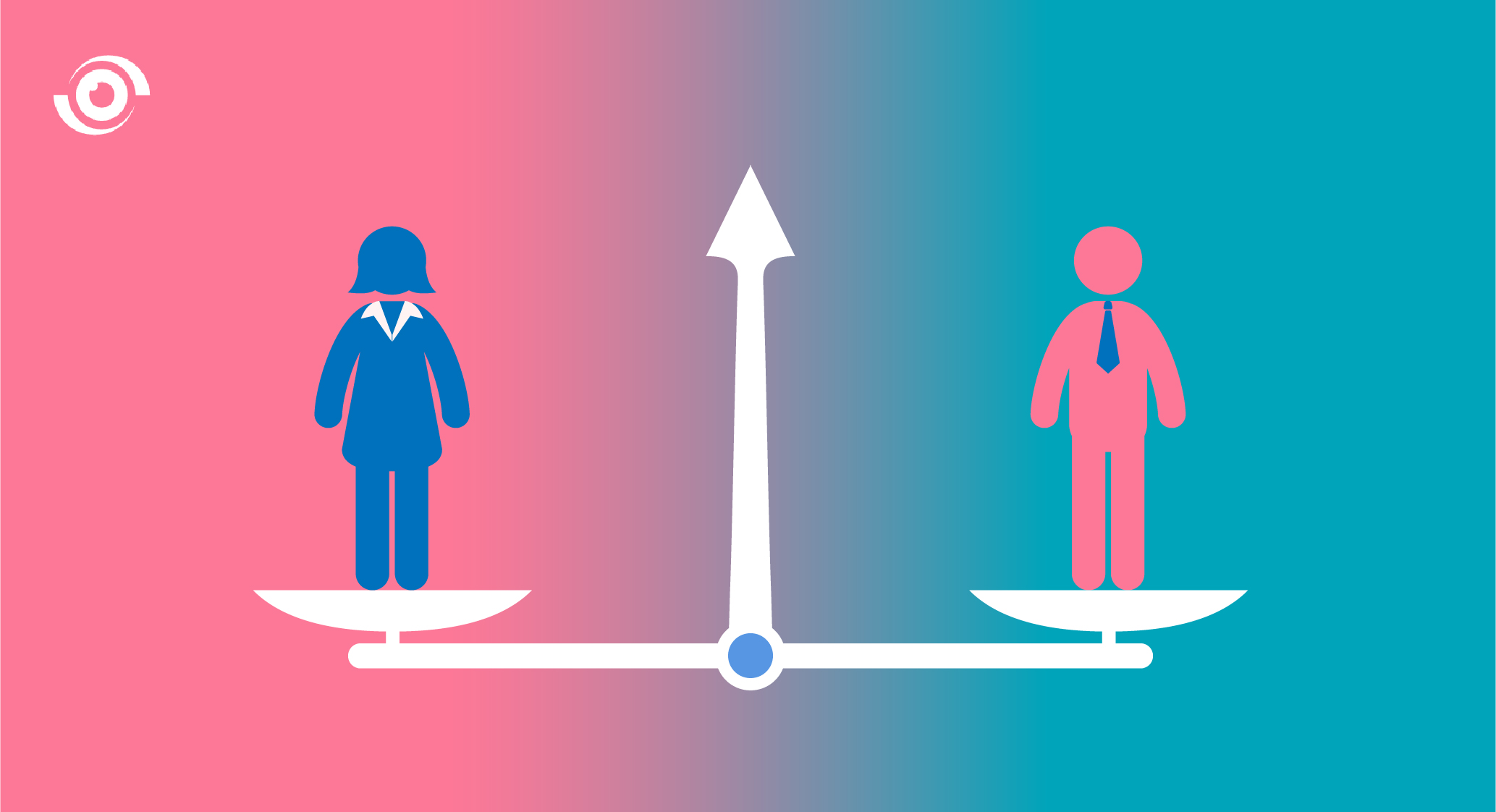
Great, great post. However, bodily autonomy should not be tailored to mainly sex, marriage and reproduction. Yes, these are all very important parts of it but it’s more than that.
My body, my choice tells more to being free to express yourself in the right context without being shamed and humiliated for it.
There were reported incidences in F.C.T, Abuja where policemen accosted “social sex workers” (some of whom wasn’t confirmed) and had their way with them using empty packs of sachet water.
As outrageous as this may seem, social constructs such mode of dressing, saying no or saying nothing has led to labelling and profiling, hence defying the core functionality of “my body, my choice”.
My body, my choice also includes respecting people enough to not shame them on weight and physical looks. But enlightening them on healthy lifestyles and practices instead of humiliating them. Women have been shamed for looking muscular e.g the great Serena Williams and men have been shamed and disrespected for being effeminate. My body, my choice!
As we insists on women’s rights, we also need to let men and the general public know that, everyone deserves to be treated with respect especially those at the receiving end of some of these written and unwritten practices.
Thank you and great job.
Thanks for your time.
This is a common disastrous challenge to the girl child.
Persistence in addressing the problem is key.
I enjoy the write up. A lot of Nigeria women prefer to be treated that way.
I employ a lot of battered women in my organization but they never believed they have to rise up and free themselves,they have lost their self confidence. It is a great problem.l give them the awareness but some are hardedned to suffering.
Well done for the work you do protecting battered women. More organisations like yours are important as women need to have those safe spaces to go to when they face domestic violence issues, in a home situation and may remain with their abuser as they do not see other avenues to pursue. It is important that as a society we have these discussions with ourselves. Thank you for your comment.
My Body My Choice, is a masterpiece. The writer used a spectacular approach to highlight the common but unspoken abuses of the girl child and women. Especially by citing classical examples (of the said Zainab and Becheve girls in Obanliku, Cross River State).
However, in my opinion it is not only the judiciary and the police that need to be educated (on the suggested laws and principles) but policy makers should also be included to make policies/laws to properly address the issue of ‘Bodily Autonomy and Gender Equality’, by implication the society at large needs to be mobilized and enlightened.
‘Bodily Autonomy’ is a new concept that should be included in school curriculum from primary to tertiary institutions so that the awareness of ‘Bodily Autonomy’ and Gender Equality’ attainment may be sped up.
The write up and the presentation are flawless. Highly educative. KUDOS!
Thank you for your positive feedback. It is critical that we raise these issues to the fore. It is any person, any woman or girl’s fundamental human right to receive just treatment and to be treated with respect with her rights protected at all times.